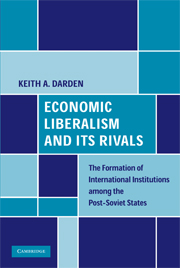 Economic Liberalism and Its Rivals
Economic Liberalism and Its Rivals Book contents
- Frontmatter
- Contents
- List of Figures and Tables
- Acknowledgments
- PART ONE THEORY AND METHODOLOGY
- PART TWO CONTINGENT SELECTION AND SYSTEMATIC EFFECTS: COUNTRY-LEVEL ANALYSES OF ELITE SELECTION, IDEATIONAL CHANGE, AND INSTITUTIONAL CHOICE, 1991–2000
- 5 The Baltic States and Moldova
- 6 Russia, Belarus, and Ukraine
- 7 The Caucasus
- 8 Central Asia
- PART THREE COMPARING CASES
- Appendix A Measurement and Coding of Economic Ideas – Additional Tests
- Appendix B Interviews Conducted by the Author
- Bibliography
- Index
6 - Russia, Belarus, and Ukraine
Published online by Cambridge University Press: 29 July 2009
- Frontmatter
- Contents
- List of Figures and Tables
- Acknowledgments
- PART ONE THEORY AND METHODOLOGY
- PART TWO CONTINGENT SELECTION AND SYSTEMATIC EFFECTS: COUNTRY-LEVEL ANALYSES OF ELITE SELECTION, IDEATIONAL CHANGE, AND INSTITUTIONAL CHOICE, 1991–2000
- 5 The Baltic States and Moldova
- 6 Russia, Belarus, and Ukraine
- 7 The Caucasus
- 8 Central Asia
- PART THREE COMPARING CASES
- Appendix A Measurement and Coding of Economic Ideas – Additional Tests
- Appendix B Interviews Conducted by the Author
- Bibliography
- Index
Summary
The three Slavic states, both individually and in comparison, also provide excellent material for testing the argument that economic ideas drive international institutional choice. We should not overstate the prospects for controlled comparison of the group despite the fact that the three states were carved out of a single country and had been unified for more than 300 years. Russia's distinctiveness – its large size, its nuclear forces, its oil and gas reserves, its international presence, its absorption of the Soviet bureaucracy, elite, and economic institutions after 1991 – obviously limits its utility for isolating causal factors through paired comparisons with its Slavic neighbors. But given the undeniably idiosyncratic and practically stochastic nature of President Boris Yeltsin's personnel changes, and the high level of variation over time in the economic ideas holding sway in the government, Russia on its own provides the means for a formidable test and demonstration of the argument in action. Indeed, Russia's nearly constant turnover in officials and the resultant shifts among economic ideologies over time make the country a laboratory unto itself if we take a longitudinal approach.
And whatever difficulties Russia may present in terms of its comparability with other cases are happily compensated for by Ukraine and Belarus, which provide extraordinary leverage in comparison. The similarities between the two countries are remarkable; it is as if the republics were designed specifically for the purpose of controlled experimentation for the effects of differences in economic ideas of the leadership.
- Type
- Chapter
- Information
- Economic Liberalism and Its RivalsThe Formation of International Institutions among the Post-Soviet States, pp. 150 - 183Publisher: Cambridge University PressPrint publication year: 2009


